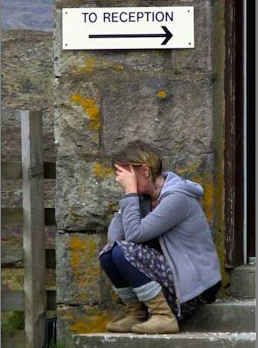Shot In The Dark
By Jenny McBain
The Northwest Highlands has mile after mile of mountainous seascape into which to invest the imagination. But that in itself, is no guarantee of a happy life. In fact, when visitors tell locals how lucky they are to live in the midst of such beauty, they often reply, “you cannot eat scenery” as an allusion to the difficulties of earning a living in more remote areas.
Rurality also poses particular challenges to those living with long term mental health issues. There is no day centre a bus ride away and, very few actual buses. So stepping out of the front door for social interaction becomes fraught with practical difficulties. And, all too often, emotional implosion sets in, compounding feelings of anxiety and depression.
‘A Shot in the Dark’ is a photography project that gives mental health service users in Wester Ross the opportunity to meet up and learn new skills. Transport is provided, costs are minimal and the experiences participants are having would appear to be incredibly beneficial. Professional photographers lead some of the sessions and the rest of the time participants are encouraged to borrow equipment and go out and about taking photographs. A camera can provide both a reason for going out and a shield between a person and the world surrounding them.
Beth lives in a one car household at the end of a single track road. She describes herself as having ongoing battles with mental health issues which impact on her daily life. After eighteen months with the photography project, she can see tangible benefits. She says, “I think coming to the group has got me going more. It helps me with getting up, getting out and meeting people.”
Beth helps her husband with his wood turning business. He turns wooden bowls and she helps to sell them. Since coming to ‘Shot in the Dark’ she has felt more confident in that role. But there are clearly other quite profound shifts taking place as is illustrated by Zoe’s wonderful photograph of a young woman apparently in great distress.
Zoe says, “Our tutor suggested that we work on the theme of isolation. I was just walking past this person and she was on her mobile phone. I thought it would make a good picture and it did. People have created loads of stories around it.”
The group has learned to appreciate the creative, perceptive, ambiguity peculiar to artists. They see the world and themselves through different eyes. Of course some people are not able to return to the world of work but great value is to be derived from meeting with others and sharing a sense of positive purpose.
Tom does not see him returning to his former life as a forester but he is courageously overcoming his problems. He says, “I had a social problem where I couldn’t meet people. I was terrified at first. Now I’m learning digital photography and a bit on the computer, I’m much more relaxed than I was to start with. I still don’t mix much but I look forward to the group. I wouldn’t have been doing this two years ago.”
Duncan is an ex-serviceman whose active tours of duty have left him with post traumatic stress disorder. However, he is finding reason to be optimistic for the future. He says, “You get a sense of achievement. I would not have thought five years ago that I would’ve have been in this situation with photography. It is a good distraction. It gets you into the zone.”
Duncan humbly underplays his talent but he has already had paid commissions from organisations such as the Crofters Commission. Another group member, Lisa, puts him straight. She tells him, “When I first saw your photographs I thought they were professional.”
In fact, a quick flick through a range of the group’s images is enough to confirm that standards are high across the board. This project was set up by a mental health social worker whose post has been deleted due to financial cutbacks. But the group lives on as a testimony to her initiative and determination to help clients who were disadvantaged by distance. It is very much run on a shoe string. Finn has put in many hours of voluntary work and the group relies on donations for equipment. A local enterprise worker is currently seeking funding to try to keep the project afloat.
An exhibition of the group’s work entitled ‘Isolation’ is currently being held in the nearby community of Torridon and there is scope to sell prints from that. The production of cards, featuring scenic shots, provides another small income stream. Donations of equipment such as Nikon lenses are welcome.
To find out more about how just six hours a week of creative provision can enhance lives take a look at http://www.galeactionforum.co.uk/page.phppage_id=5&status=current&id=3















Write Your Comment